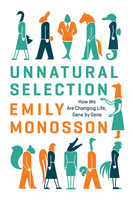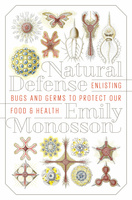Emily Monosson
Showing 1-3 of 3 items.
Evolution in a Toxic World
How Life Responds to Chemical Threats
Island Press
- Copyright year: 2012
Unnatural Selection
How We Are Changing Life, Gene by Gene
Island Press
Gonorrhea. Bed bugs. Weeds. Salamanders. People. All are evolving, some surprisingly rapidly, in response to our chemical age. In Unnatural Selection, Emily Monosson shows how our drugs, pesticides, and pollution are exerting intense selection pressure on all manner of species. And we humans might not like the result.
Monosson reveals that the very code of life is more fluid than once imagined. When our powerful chemicals put the pressure on to evolve or die, beneficial traits can sweep rapidly through a population. Species with explosive population growth—the bugs, bacteria, and weeds—tend to thrive, while bigger, slower-to-reproduce creatures, like ourselves, are more likely to succumb.
Unnatural Selection is eye-opening and more than a little disquieting. But it also suggests how we might lessen our impact: manage pests without creating super bugs; protect individuals from disease without inviting epidemics; and benefit from technology without threatening the health of our children.
Monosson reveals that the very code of life is more fluid than once imagined. When our powerful chemicals put the pressure on to evolve or die, beneficial traits can sweep rapidly through a population. Species with explosive population growth—the bugs, bacteria, and weeds—tend to thrive, while bigger, slower-to-reproduce creatures, like ourselves, are more likely to succumb.
Unnatural Selection is eye-opening and more than a little disquieting. But it also suggests how we might lessen our impact: manage pests without creating super bugs; protect individuals from disease without inviting epidemics; and benefit from technology without threatening the health of our children.
- Copyright year: 2014
Natural Defense
Enlisting Bugs and Germs to Protect Our Food and Health
Island Press
We rely on chemical cures to keep our bodies free from disease and our farms free from bugs and weeds. While human and agricultural health are rarely considered together, both are based on the same ecology, and both are being threatened by organisms that have evolved to resist our antibiotics and pesticides. Fortunately, scientists are finding new solutions that work with, rather than against, nature. There are viruses that bust apart bacteria; insect pheromones that throw crop-destroying moths into a misguided sexual frenzy; plant genes edited to protect against disease; and a resurgence of the ancient practice of fecal transplants. In this hopeful book, Monosson offers a fascinating look into the future of natural defenses.
- Copyright year: 2017
Stay Informed
Subscribe nowRecent News


